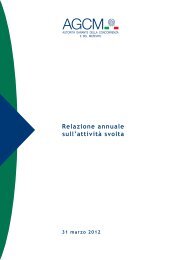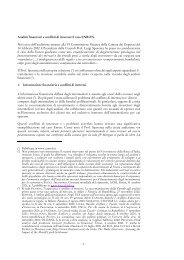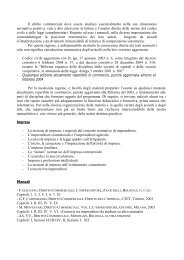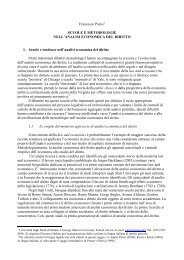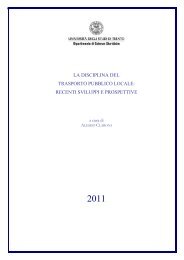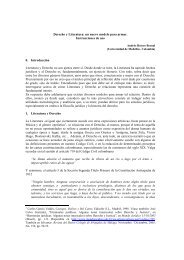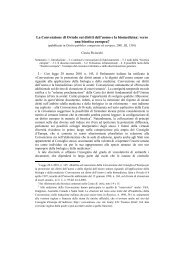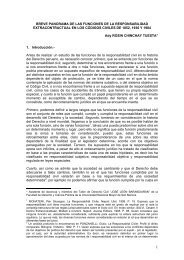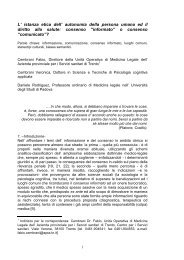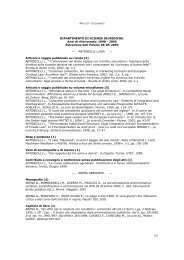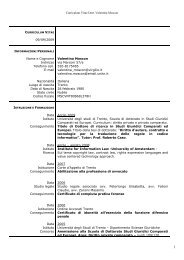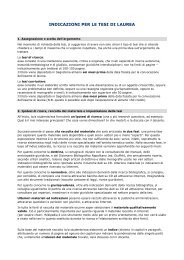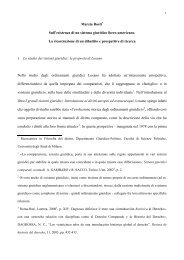The Futility of Unification and Harmonization in International ...
The Futility of Unification and Harmonization in International ...
The Futility of Unification and Harmonization in International ...
Create successful ePaper yourself
Turn your PDF publications into a flip-book with our unique Google optimized e-Paper software.
Other, less benign ends also might prompt unification <strong>in</strong> this area. Nations that mostly consumeprimary products <strong>and</strong> sell f<strong>in</strong>ished goods (<strong>in</strong> other words, the first world) might want to confrontdevelop<strong>in</strong>g countries with a set <strong>of</strong> rules that discourages redistribution or <strong>in</strong>dependence from theglobal economy. Specialists <strong>in</strong> <strong>in</strong>ternational trade might want to maximize the value <strong>of</strong> their servicesby promot<strong>in</strong>g a legal regime that requires their participation for the consummation <strong>of</strong> the mostord<strong>in</strong>ary transaction. Experts <strong>in</strong> contract law might regard the <strong>in</strong>ternational lawmak<strong>in</strong>g process asan end <strong>in</strong> itself, lead<strong>in</strong>g to travel, research opportunities, <strong>and</strong> the stature that comes with a personall<strong>in</strong>k to an <strong>in</strong>ternational <strong>in</strong>strument.For whatever reasons, the effort to produce a unified set <strong>of</strong> rules for <strong>in</strong>ternational contracts began<strong>in</strong> the 1920s, not long after the start <strong>of</strong> the process that led to the Warsaw Convention <strong>and</strong> HagueRules. UNIDROIT began work on a draft treaty <strong>in</strong> 1930 but, distracted by the Great Depression <strong>and</strong>World War II, achieved noth<strong>in</strong>g until the 1960s. A diplomatic conference convened <strong>in</strong> 1964 toconsider UNIDROIT’s efforts adopted a convention on the formation <strong>of</strong> <strong>in</strong>ternational sales contracts<strong>and</strong> another on the content <strong>of</strong> such contracts, but the newly decolonized <strong>and</strong> develop<strong>in</strong>g statesroundly declared these <strong>in</strong>struments unacceptable. Seek<strong>in</strong>g to keep the process alive, the promoters<strong>of</strong> unification shifted its venue to UNCITRAL. This proved a wise choice. 44<strong>The</strong> Convention on the <strong>International</strong> Sale <strong>of</strong> Goods (CISG) became the most widely adopted <strong>and</strong><strong>in</strong>fluential <strong>of</strong> UNCITRAL projects. Follow<strong>in</strong>g another decade <strong>of</strong> deliberation, a Work<strong>in</strong>g Grouppublished a draft <strong>in</strong> 1978, <strong>and</strong> UNCITRAL convened a conference to adopt a f<strong>in</strong>al version <strong>in</strong> 1980.It went <strong>in</strong>to force for the first eleven signatories, <strong>in</strong>clud<strong>in</strong>g the United States, <strong>in</strong> 1988. As <strong>of</strong> May1998, fifty-six countries, <strong>in</strong>clud<strong>in</strong>g most major trad<strong>in</strong>g nations other than Japan or the UnitedK<strong>in</strong>gdom, had adopted the CISG.<strong>The</strong> CISG epitomizes a unification agreement for which legal academics played the dom<strong>in</strong>ant role<strong>in</strong> shap<strong>in</strong>g the agenda <strong>and</strong> content <strong>of</strong> the <strong>in</strong>strument. At the 1980 conference, a law pr<strong>of</strong>essorpresided. Many <strong>of</strong> the most important delegations, <strong>in</strong>clud<strong>in</strong>g that <strong>of</strong> the United States, had academicsat their head or as members. No particular <strong>in</strong>dustry or <strong>in</strong>terest group had an obviously dist<strong>in</strong>ct stake<strong>in</strong> the outcome <strong>of</strong> the negotiations. Most bus<strong>in</strong>ess both buy <strong>and</strong> sell goods, mak<strong>in</strong>g them largely<strong>in</strong>different among rules that favor buyers or sellers. And the Convention does not s<strong>in</strong>gle out nicheactivities where a particular group would care about the applicable rules.<strong>The</strong> CISG conta<strong>in</strong>s few if any provisions that would annoy any particular <strong>in</strong>terest group. Its rulesdo not transparently promote exploitation <strong>of</strong> primary product exporters, although <strong>in</strong> the most generalsense the CISG does bolster <strong>and</strong> susta<strong>in</strong> a capitalist trad<strong>in</strong>g system based on (perhaps false)assumptions about arms-length exchange. Nor does it encourage redistribution or restitution for past2344See generally John O. Honnold, <strong>The</strong> United Nations Commission on <strong>International</strong> Trade Law: Mission <strong>and</strong> Methods,27 AM. J. COMP. L. 201 (1979); John A. Spanogle, <strong>The</strong> Arrival <strong>of</strong> <strong>International</strong> Private Law, 25 GEO. WASH. J. INT’L L. &ECON. 477 (1991). <strong>The</strong> two <strong>in</strong>struments generated by the UNIDROIT process, the Convention Relat<strong>in</strong>g to a Uniform Law onthe <strong>International</strong> Sale <strong>of</strong> Goods, 834 U.N.T.S. 107 (1972), <strong>and</strong> the Convention Relat<strong>in</strong>g to a Uniform Law on the Formation<strong>of</strong> Contracts for the <strong>International</strong> Sale <strong>of</strong> Goods, 834 U.N.T.S. 169 (1972), did go <strong>in</strong>to effect but only with respect to a h<strong>and</strong>ful<strong>of</strong> states.



